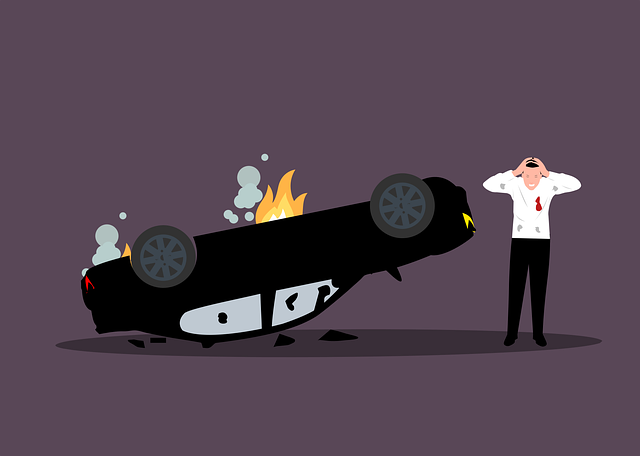Unraveling Liability in Motorcycle Accident Wrongful Death Cases

Motorcycle accident wrongful death cases are legally complex, focusing on factors like driver neglig…….
In the realm of transportation safety, motorcycle accidents hold a disproportionately high number of fatal outcomes compared to other vehicle types. Among these tragic incidents, “motorcycle accident wrongful death” refers to scenarios where a rider loses their life due to another party’s negligence or intentional actions. This article aims to delve into the multifaceted issue, exploring its causes, global impact, economic implications, technological responses, regulatory frameworks, and future prospects. By understanding this complex phenomenon, we can advocate for safer roads and support survivors affected by such devastating events.
Definition: Motorcycle accident wrongful death occurs when an individual dies as a direct result of injuries sustained in a motorcycle collision that was caused by another party’s negligence, recklessness, or intentional misconduct. This can include drivers of motor vehicles, pedestrians, or even other cyclists who breach their legal duties, leading to the tragic loss of a motorcycle rider’s life.
Core Components:
Historical Context:
The concept of motorcycle accident wrongful death has evolved alongside changing traffic laws and safety standards. In many jurisdictions, motorcycle riders have historically faced challenges in establishing liability due to perceived risks associated with their mode of transportation. However, as motorcycling becomes more popular and technological advancements introduce safer bikes and riding gear, the narrative is shifting. Modern legal systems recognize that drivers and other parties owe a duty of care to protect motorcyclists on the road, leading to stricter laws and more successful wrongful death claims.
Significance:
Motorcycle accident wrongful death cases serve as a crucial reminder of the unique risks faced by riders and the responsibility of others to share the road safely. They also provide a mechanism for accountability when negligence or misconduct leads to irreversible loss. These cases often spark public discussions on traffic safety, prompting changes in driver education, road design, and legislation to protect vulnerable road users, including motorcyclists.
Motorcycle accident wrongful death is not limited to specific regions but affects countries worldwide, though its impact varies significantly. Several factors influence this variability:
Regional Trends:
The economic aspects of motorcycle accident wrongful death are multifaceted and intertwined with various sectors:
| Aspect | Description | Impact |
|---|---|---|
| Market Dynamics | Motorcycling industries, including manufacturers, dealers, and related businesses, are influenced by changes in consumer demand and safety perceptions. | A reduction in fatal accidents could lead to increased market growth as more individuals feel confident in motorcycling as a safe mode of transport. |
| Investment Patterns | Investors in real estate, insurance, and transportation infrastructure must consider the economic impact of motorcycle accidents when making decisions. | Areas with higher accident rates may see reduced property values and investment, while safer regions could attract more businesses and tourism. |
| Health Care Costs | Medical expenses for motorcycle crash victims, including long-term care for those with permanent disabilities, contribute to healthcare system strain. | Effective safety measures can reduce these costs, freeing up resources for other critical health initiatives. |
| Insurance Industry | Insurance companies assess risk based on accident statistics, and wrongful death claims significantly impact their financial outcomes. | Improved safety records can lead to more favorable insurance rates for motorcyclists and potentially lower premiums for insurers. |
| Economic Loss for Families | Beyond the direct medical costs, families suffering from wrongful death face indirect economic losses due to lost wages (if a primary breadwinner dies), funeral expenses, and reduced quality of life. | Effective legal protections and compensation can help offset these financial burdens. |
Technology plays a dual role in motorcycle accident wrongful death, offering both preventive measures and post-accident support:
Regulatory frameworks play a vital role in shaping the landscape of motorcycle accident wrongful death:
Despite significant progress, several challenges and criticisms persist in the realm of motorcycle accident wrongful death:
Solutions and Strategies:
Case 1: The Impact of Comprehensive Safety Programs – Australia
Australia’s state of Victoria implemented a multi-faceted safety program focusing on driver education, road infrastructure improvements, and strict enforcement of traffic laws. This initiative included mandatory helmet laws, enhanced training programs for new drivers, and the installation of speed cameras and dedicated motorcycle lanes. As a result, Victoria experienced a significant 40% reduction in motorcycle accident fatalities over a five-year period, demonstrating the power of comprehensive safety measures.
Case 2: Technology-Driven Accident Prevention – Sweden
Sweden’s Vision Zero initiative aims to eliminate all traffic-related deaths and serious injuries. This strategy leverages technology to monitor road conditions, detect dangerous driving behavior, and provide real-time feedback to drivers. The country’s extensive network of smart roads, equipped with sensors and cameras, allows for precise accident analysis and the implementation of targeted safety interventions. Sweden’s success in reducing motorcycle and other traffic fatalities serves as a global model for using technology to enhance road safety.
Case 3: Cultural Shift and Improved Infrastructure – Japan
Japan has achieved remarkable success in reducing motorcycle accident rates through a combination of cultural shifts, driver education, and infrastructure improvements. The country’s strict helmet laws, along with public awareness campaigns that emphasize the responsibilities of both motorcyclists and drivers, have contributed to lower accident numbers. Additionally, Japan’s investment in well-designed highways with separate lanes for motorcycles has significantly enhanced rider safety.
The future of motorcycle accident wrongful death is shaped by emerging trends and technological innovations:
Motorcycle accident wrongful death is a critical issue that demands global attention and proactive solutions. By understanding its causes, impact, and the diverse landscape in which it operates, we can advocate for evidence-based policies and technologies to enhance road safety. The cases studied illustrate successful strategies, showcasing the potential for significant progress in preventing tragic motorcycle accidents and supporting survivors and their families.
As technology evolves and societal attitudes towards motorcycling continue to shift, the future of motorcycle accident wrongful death will be shaped by a balance between technological advancements and human responsibility. By embracing these changes and learning from past experiences, we can work towards safer roads for all users, ensuring that motorcyclists’ rights are protected while fostering a culture of shared road responsibility.
Q: Are motorcycle accidents more common in certain areas or countries?
A: Yes, the rate of motorcycle accidents varies globally due to factors like cultural attitudes towards motorcycling, traffic infrastructure, safety regulations, and economic development. Some regions, such as Asia-Pacific and parts of Latin America, experience higher accident rates due to a combination of these influences.
Q: How can I protect myself as a motorcyclist?
A: Motorcyclists can enhance their safety by wearing appropriate protective gear, including helmets, gloves, jackets, and boots designed for motorcycle riding. Staying visible to other drivers through reflective clothing and signaling your intentions clearly can also help prevent accidents. Regular maintenance of your vehicle and being aware of your surroundings are additional key strategies.
Q: What should I do if I’m involved in a motorcycle accident?
A: If you’re involved in an accident, prioritize your safety first. Call emergency services if needed. Document the incident by taking photos of the scene, exchanging insurance information with other parties, and gathering contact details of witnesses. Seek medical attention promptly, even if you feel uninjured, as some injuries may not be immediately apparent.
Q: Can technology entirely prevent motorcycle accidents?
A: While technology plays a significant role in enhancing road safety, it cannot guarantee the prevention of all motorcycle accidents. Human factors, such as driver distraction, speeding, or fatigue, will always be a concern. However, combining advanced technologies with responsible riding practices and strict enforcement of traffic laws can significantly reduce accident rates.
Q: How do I know if my country’s motorcycle safety regulations are effective?
A: Assessing the effectiveness of your country’s motorcycle safety regulations involves examining accident statistics over time, comparing them to regional peers, and considering public feedback and expert opinions. Organizations like the World Health Organization (WHO) provide global resources and guidelines for evaluating and improving traffic safety infrastructure, including motorcycle safety.

Motorcycle accident wrongful death cases are legally complex, focusing on factors like driver neglig…….

Families affected by a motorcycle accident resulting in wrongful death can seek justice and compensa…….

Motorcycle accident wrongful death cases often stem from driver negligence, including speeding, runn…….

In case of a fatal motorcycle accident, families must understand complex legal and insurance procedu…….

In cases of fatal motorcycle accidents, skilled legal representation is vital for families seeking j…….

In the event of a motorcycle accident resulting in wrongful death, families must navigate complex le…….

When a motorcycle accident leads to a fatal outcome, a motorcycle accident wrongful death lawsuit al…….

Motorcycle accidents leading to wrongful death have severe impacts on families, making it vital to u…….